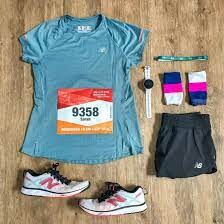Running News Daily
Running News Daily is edited by Bob Anderson. Send your news items to bob@mybestruns.com Advertising opportunities available. Train the Kenyan Way at KATA Kenya and Portugal owned and operated by Bob Anderson. Be sure to catch our movie A Long Run the movie KATA Running Camps and KATA Potato Farms - 31 now open in Kenya! https://kata.ke/
Index to Daily Posts · Sign Up For Updates · Run The World Feed
How to Prepare For Your Very First Running Event
Ever have the inkling or desire to run a race? Many are drawn to the excitement and challenge of preparing for a running event. Whether you want to tackle your first 5K, upgrade to a 10K or feel inspired to run a marathon, racing is not difficult when you have the right mindset and the proper tools.
“Running any race requires dedication and preparation. You want to go the distance and cross the finish line,” says exercise physiologist Katie Lawton, MEd. “But it’s important to remember that although races are meant to be challenging, they’re also meant to be fun.”
Here are some important steps you can take as you prepare for your event:
1. Make sleep a priority

Try to get at least seven to eight hours of sleep each night during your training. Some people require more than that and some require less, but it’s important to listen to your body’s needs. There’s evidence that shows even a little bit of sleep loss can hinder your athletic performance.
Focus on being well-rested as race day approaches. You’re aiming to be alert and energized on race day.
2. Practice and plan
It doesn’t matter how many miles your race will cover — preparation is the key to conquering any distance, but especially for beginners:

Run several times a week to condition your body. When planning your race training schedule, determine how many days a week you can put aside to run. Work with a coach or find a training plan online that you like. Do some research about the race course and know what your longest training run will be leading up to the race.
Determine ahead of time what your fueling strategies are — do you need an energy gel during the race? What about water or other electrolyte drinks?
Experiment before the race with various types of running clothes and decide what’s most comfortable. Certain fabrics irritate some people’s skin, so know what you’ll plan to race in and make sure it doesn’t cause any discomfort (including your shoes!).
3. Set a goal and a backup goal
You might have a time goal that you’d like to achieve on race day or maybe you’d just like to be able to run the entire time. Unfortunately, things happen on race day that are out of our control. You might not feel your best or the weather may not cooperate. For example, a downpour on the day of the race will slow everyone down. As a result, you might not hit the time you wanted, but you could have a secondary target in mind to work toward.
There are so many things out of your control on race day that you should always have a backup goal. (And yes, sometimes the goal turns into “just finishing,” which is OK too!)
4. Hydrate before and during the race
As a runner, it’s vital for you to avoid dehydration. In most cases, plain old water is the best way to go, but there’s a big difference between short races and long races. 5K and 10K runners should mainly look at fueling and hydrating before and after the race. Some hydration may be necessary for a 10K during the event, but it will depend on the person. Neither of these shorter races should require a person to consume an energy gel and can simply be fueled by eating the right foods prior to the race. For half and full marathon runners, investigate and find a gel or fuel source that works for you and doesn’t cause GI distress. It’s a good idea to practice hydrating before, during and after long runs. That way, you’ll know what’s necessary on race day.
5. Stay upbeat and positive
You know what they say – attitude is everything! Maintain a positive attitude during your training and leading up to your race. A positive mental attitude can put you on track for success and help you overcome challenging situations. And again, remember – running a race is supposed to be fun! You’re doing something challenging and getting out of your comfort zone, which should make you feel positive and excited!
6. Relax and enjoy the run
Having jitters before a race is common. It’s a normal part of any competition and means you care about your performance and want to do well. Plus, the boost in adrenaline might even help you perform better. Focus on ways to keep yourself calm and relaxed. Maybe that’s listening to music, doing some stretches or focusing on your breathing.
7. Start out slow
Finally, don’t try to set a record in your first mile out. It’s best to pace yourself and follow your strategy for your time goal. Start slowly and gradually increase your stride until you’re settled in your normal training pace.
Get your doctor’s go-ahead first
Before you start training for any road race, it’s a good idea to talk to your doctor. He or she may have some running suggestions that suit your needs and can address any possible limitations you have. They can also refer you to other providers, like a physical therapist, to make sure your form is correct and you’re wearing the proper shoes.
by Health Essentials
Login to leave a comment




